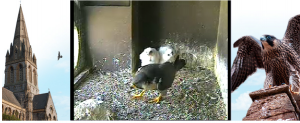In case you’ve not been following this year’s fledging on Twitter, here’s the news in brief so far.
Juvenile with leg ring PG fledged early Mon 13 June, exactly 42 days after hatching. He flew a bit, got mobbed by gulls, was found in an Exeter College car park, and rescued because newly fledged young find it difficult to get airborne from flat ground. PG was returned to the Church, and spent a night on tiles.


Tue 14 June, PG was rescued again, and was hand fed road-kill squirrel by a local vet. This is more intervention than we would like, but is what would be done for any animal found in distress.

PG was re-roofed, rescued and re-roofed again before he flew off, again attracting unwanted attention from the local gulls, and spent the night on Exeter Community Centre. Meanwhile PH had decided on another day of feeding and wing flapping in the nest box.


Juvenile PH fledged early Wed to the Church roof and spent the day exploring its roofs. No intervention was required today. Meanwhile we were pleased that PG was found back at the Church, flying more confidently. So by end of Wed 15 June we had 2 adults & 2 juveniles active on St Mike’s.
That’s all I know so far – seagulls still a nuisance, but things looking fairly good.
Update Fri 24 June – now the juveniles are on their own with the adults, learning to fly and hunt, and we have to take our chances as to how many we see together at the church.
The juveniles will start to fly further afield as they get more confident over the next few weeks.
As far as I know – I’ve certainly not heard otherwise – both juveniles are strong and well, and all 4 birds are using the church as their base and for roosting. But there’s been little sign of the young going back into the nest box, unlike in some previous years.
Update Thu 4 Aug – sadly, on Thursday 28 July, one of this year’s juveniles, PG who had received such care in the 2 days after fledging, was found dead in Paul Street, Exeter, apparently after a flying accident.
The events this year at Norwich Cathedral nest site remind us not to be over-sentimental about these magnificent wild birds of prey. “Mother Nature” is not always as gentle as we like to imagine. There, an incoming younger female, from the urban site in Bath apparently, displaced the male’s older mate from previous years after she had laid her eggs; the male was a dutiful single parent feeding all 4 chicks that hatched; but as they came due to fledge the new female became aggressive to these chicks that were nor her own; two died and two which made it to the ground have been taken into care, hoping that they can be saved and released back into the wild in due course. Ours is not to question their natural behaviour – rather to reflect on humanity’s varied behaviours.
From earlier this year, a week before fledging.
And 3 weeks before fledging.
